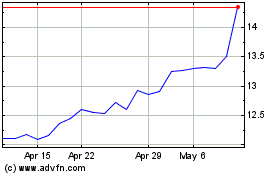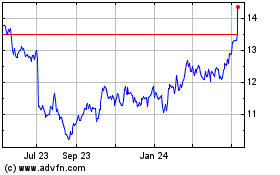By Steven Russolillo and Joanne Chiu
Protests are denting Hong Kong's economic growth, business
sentiment and financial markets.
A worsening spiral of violence and demonstrations marks the
former British colony's worst social and political crisis since it
returned to Chinese rule in 1997. The controversial prospect of
extraditions to mainland China, and the resulting unrest, have
clouded Hong Kong's status as a global financial center.
On Tuesday, Hong Kong Chief Executive Carrie Lam said there is
"no room for optimism" on economic growth this year, citing
uncertainties related to the protests and the U.S.-China trade
dispute.
The next day the government estimated that inflation-adjusted
second-quarter gross domestic product was up a modest 0.6% from a
year earlier, as "local economic sentiment deteriorated visibly in
the face of increasing downside risks facing the global economy and
other headwinds."
The pressure has weighed on property and retail stocks, helping
put the benchmark Hang Seng Index on track to be one of the worst
July performers among its global peers.
Finance-industry workers were preparing to participate in a
flash-mob protest on Thursday, making the same key demands as many
other recent protests, including permanent withdrawal of the
extradition bill and an independent investigation into police
conduct. A digital flier for the event circulating on social media
was headlined "freedom snooze, market lose."
Retailers and tour agents have been hit by tensions in normally
bustling commercial and residential districts. Last week, a
lawmaker who represents the city's tourism sector said some tourist
agencies had inquiries about possible cancellations of corporate or
study trips to Hong Kong in August. He said the growth rate for
tourism arrivals had slowed to 8.5% after the demonstrations began
in June, down from 15% in the first five months of the year.
"There is a lot of uncertainty in Hong Kong," said Mariana Kou,
head of Hong Kong consumer research at CLSA, a brokerage. "It's a
tough time for local retailers as we're seeing more widespread and
frequent demonstrations and clashes in the city."
The share price of major retail landlord Wharf Real Estate
Investment Co., owner of the Times Square and Harbour City malls,
has fallen 9.7% this month to its lowest level since January.
Chow Tai Fook Jewellery Group Ltd., the world's second-largest
jeweler after Tiffany & Co., dropped 12% in July after surging
the prior month. It said sales at stores in Hong Kong and Macau
that had been open at least a year fell sharply in the three months
to June. Smaller rival Luk Fook Holdings (International) Ltd.
dropped 3.3% this month.
Mainland Chinese visitors to Hong Kong are among jewelers'
biggest customers.
Shares of MTR Corp., a property company that operates Hong
Kong's train system, has dropped more than 7% over the past two
weeks. The shares hit a record closing high on July 18; later that
day the company released a profit warning. Protesters disrupted
train services on Tuesday, slowing some lines and forcing others to
suspend service.
Smaller companies appear most vulnerable. Ms. Kou said she
expects sales figures for the retail and tourism sectors to
deteriorate further through the summer. She said the disruptions
drove double-digit percentage sales declines for some retailers
during the past weekends, based on CLSA's channel checks, in which
it collects information from third-parties such as distributors and
customers.
A sentiment index of small and midsize companies in Hong Kong
fell to a three-year low, according to a survey by Standard
Chartered PLC.
Foreign companies are also suffering. In a survey published this
week, the American Chamber of Commerce in Hong Kong said it found
more international businesses pessimistic about short-term
prospects for the city. Respondents, spanning sectors including
financial services, logistics and technology, said escalating
violence and political deadlock were fueling perceptions Hong Kong
is becoming a riskier place to do business.
Also this week, Fitch Ratings warned that "unrest and apparent
rising distrust in government" risks damaging business confidence
and eroding the city's governance. It has a stable AA+ rating on
Hong Kong, three notches higher than its rating on mainland China,
but said some of the assumptions that underpin that rating are
being tested, including those about the effectiveness of the
territory's governance and its rule of law.
Even after a rough July, though, the Hang Seng is up roughly 8%
for the year. And much of the decline this month is due to drops in
major mainland stocks, such as China Unicom, Country Garden and
China Construction Bank.
David Webb, an activist investor in Hong Kong, said that the
city's stock market isn't necessarily the best reflection of the
Hong Kong economy, since roughly two-thirds of the Hang Seng Index
are companies that operate mostly in mainland China.
"The bigger issue is obviously whether the situation will get
worse," he said. "With weekly if not daily protests, which have
become increasingly violent as protesters test the will of the
authorities, there isn't any obvious end in sight."
Joyu Wang contributed to this article.
Write to Steven Russolillo at steven.russolillo@wsj.com and
Joanne Chiu at joanne.chiu@wsj.com
(END) Dow Jones Newswires
July 31, 2019 07:21 ET (11:21 GMT)
Copyright (c) 2019 Dow Jones & Company, Inc.
China Construction Bank (PK) (USOTC:CICHY)
Historical Stock Chart
From Jan 2025 to Feb 2025

China Construction Bank (PK) (USOTC:CICHY)
Historical Stock Chart
From Feb 2024 to Feb 2025
